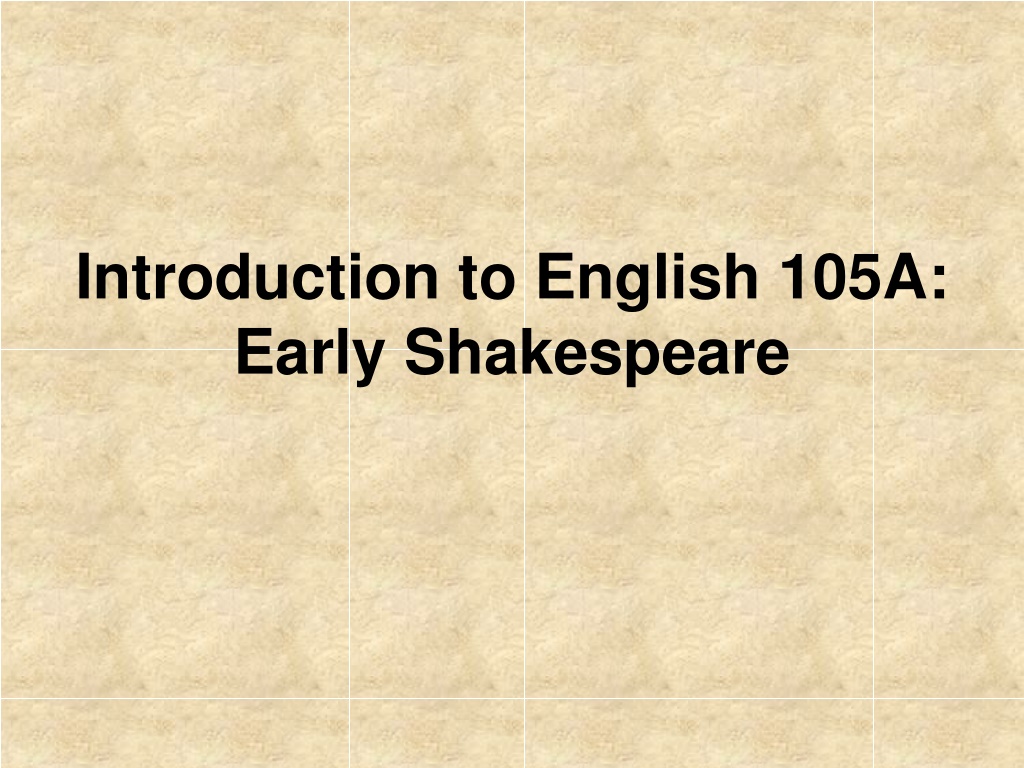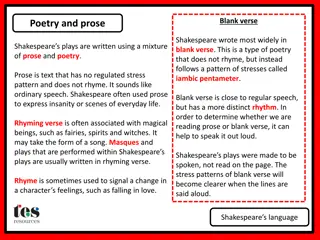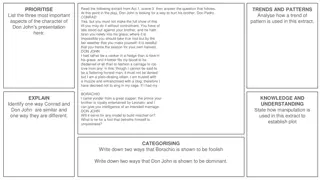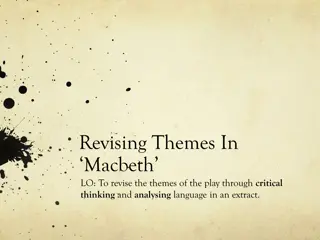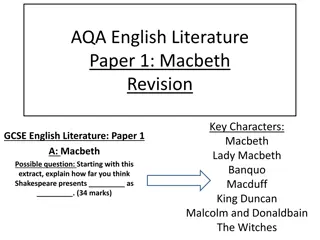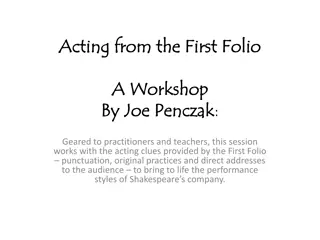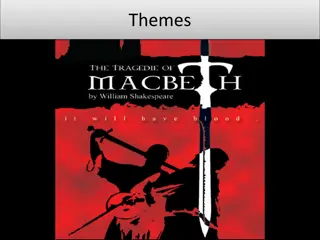Unveiling the Life and Works of Early Shakespeare
Delve into the intriguing life of Shakespeare through a journey exploring the known details of his birth, marriage, and career. Discover the mystery surrounding his identity and the various portraits that offer unique perspectives on the legendary playwright.
Download Presentation

Please find below an Image/Link to download the presentation.
The content on the website is provided AS IS for your information and personal use only. It may not be sold, licensed, or shared on other websites without obtaining consent from the author. Download presentation by click this link. If you encounter any issues during the download, it is possible that the publisher has removed the file from their server.
E N D
Presentation Transcript
Introduction to English 105A: Early Shakespeare
How much do we know about Shakespeare's life? A) Almost nothing. We can only make guesses. B) Some significant details (birth?, marriage, death, major events, some business details). We can make educated guesses about some personal details. C) Most details. Some argument over identity of figures in his poetry, but the details of Shakespeare's life are clear. D) Almost everything. Some scholars debate identity of figures in his poetry, but most scholars agree on all details of his life.
The Bare-Bones of Shakespeare's Life, Stratford born in Stratford; baptized 26 April 1564 traditionally given birthdate of 23 April (died 23 April, 1616) married Anne Hathaway 27 November 1582 had 3 children between 1585 and 1592 he leaves his family and Stratford for London
The Bare-Bones of Shakespeare's Life, London by 1592, he had both acted in and written plays in 1594 a charter member of the theatrical company the Chamberlain's Men; in 1603 it became the royal company, the King's Men from 1599, his company acted primarily at the Globe theater, in which Shakespeare held a 1/10th interest in 1597, he bought New Place (the second-largest house in Stratford)
The Bare-Bones of Shakespeare's Life, Stratford Redux about 1610-11, he retired to Stratford on April 23, 1616 he died.
Imagining Shakespeare Extant Portraits of Shakespeare (images 1-3) Gallery login: Username: undergrad Password: swift
Which portrait do you like best? 1 (A) 2 (B) 3 (C)
Each of the three extant portraits shows us An image of a different Shakespeare, and so each lends itself to a different way of thinking about Shakespeare.
Not of an Age but For All Time: The First Folio, 1623 Dominance of First Folio image (#1) (image 4) distinct from other Folio title pages (e.g., images 5-6)
Not of an Age but For All Time: The First Folio, 1623 But also one weird looking dude Indeed, the verses that accompany the picture, steer us away from looking at it (image 4) Don t look to his picture for the Nature and wit of Shakespeare Reader, looke . . . on . . . his Booke. "True Originall Copies"
Not of an Age but For All Time: The First Folio, 1623 In one camp, Anti-Stratfordians propose other more "true" authors (images 7-11) In another camp, scholars pursue meaning solely in his Booke (formalism, new criticism) history falls out of the picture solely close textual analyses dominate
Ben Jonson's commendatory poem in the First Folio seeks to raise Shakespeare above the particular or local of his times: But stay, I see thee in the Hemisphere Aduanc'd, and made a Constellation there! Shine forth, thou Starre of Poets, and with rage, Or influence, chide or cheer the drooping Stage; Which, since thy flight from hence, hath mourn'd like night, And despaires day, but for thy Volumes light.
The New Political Shakespeare Promulgated since 1980s on two fronts: British cultural materialism American new historicism texts localized in complex and shifting matrix of history multiple interpretations and even multiple textual variations acknowledged embrace other images of Shakespeare (see Images 2-3)
As Example: The Framing of The Shrew Who is Sly? a) a servant b) a drunk c) a suitor d) a gentleman e) an actor
A Shrew In 1594, a play called A Pleasant Conceited Historie, called The taming of a Shrew was entered in the Stationers Register and printed. The play is listed as anonymous and has been dismissed as a) a defective copy of The Shrew b) a later play More recently, often seen as an earlier version also written by Shakespeare
There are some significant differences with the induction/framing in the two plays
A Shrew The Shrew Sly asks male tapster for more ale, then falls asleep Sly argues with alewife for his legal rights and "noble" bloodline, then falls asleep, p.3 Lord takes Sly home to trick him into thinking he is a Lord The Lord hears the players' horn; but he at first thinks its another noble seeking repose The players speak eloquently The play ends without returning to the Sly plot (complicating staging the Induction for many directors so much so that many productions omit the induction entirely) Lord takes Sly home to trick him into thinking he is a Lord A servant announces the arrival of the players to the lord The players speak roughly Sly is returned to the tavern and wakes up thinking he has had a dream that has taught him how to tame his own wife: Ile to my / Wife presently and tame her too / And if she anger me.
Introducing the Taming of the Shrews The Taming of The Shrew viewed beside The Taming of A Shrew, and embedded in cultural history, offers new reflections on the action of The Taming play. Three fantasies triggered in the Induction: 1. Dream fantasy of Sly taming the overpowering alewife in the main plot of Petruchio taming (transforming) Kate 2. Fantasy of Lord taming/transforming his own idleness and containing the potentially threatening idleness of the displaced vagrant, Sly (9) 3. Fantasy of Shakespeare taming/transforming his lowlife status of vagrant player and achieving "gentleman" status
What is the effect of not reinstating the frame at the end of The Shrew as at the end of A Shrew? A) Fantasies lose prominence and power. B) Fantasies become more "real" and powerful. C) Shakespeare shown to be a bad writer of conclusions, whether promoting fantasy or not.
